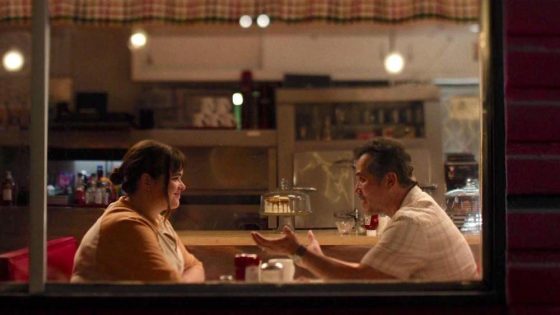Writer-director Tracie Laymon has a lot of Bobs in her life.
First, there was Bob Laymon, her father.
“In 2012, I was looking for my dad,” she says. “He would just feel disrespected for even the most minor infractions, and he’d disappear for a year or two and not talk to me. So I put his name into Facebook and saw this little tiny picture. I friended him and woke up to ‘Bob Laymon likes it.’ I was like, ‘My dad likes something of mine! We’re back! It’s gonna be okay.’”
It wasn’t okay yet. This was a second Bob Laymon.
“It was a stranger in Wichita, Kansas,” Laymon says, “who continued to be more fatherly to me than my dad ever was — he filled the void. He had such access to my heart because of his name. My dad never wrote me happy birthday, but [on Facebook], I’d get ‘Bob Laymon says “Happy birthday!” My dad never came to my screenings, but I’d get an award, and it’s: ‘Bob Laymon says, “Way to go, kiddo!”‘”
Laymon never met the man she calls Facebook Bob in real life, but imagining what it might look like if she had helped her to write “Bob Trevino Likes It,” a film starring Barbie Ferreira and John Leguizamo that’s competing in SXSW‘s 2024 narrative feature competition. Throughout the process, Laymon found ways to ground even the fictionalized plot points in reality — that’s where the third Bob comes in.
“I needed to change the name, because I was worried that my dad would sue me. There had been this gentleman in Austin, Bob Trevino, and he and his wife had always been so kind to me from my very first film set. So I said, ‘Can I use your name? Because you have such a good heart, and then I can combine these and it will feel real to me when I’m writing it.’”
Rather than a traditional rehearsal process, Ferreira focused on getting to know Laymon while preparing to play Lily, the character Laymon wrote based on herself. “We’d go to a diner, get food and talk about family trauma,” Ferreira says. “It felt like the only time I’ve ever seen this particular family dynamic that is so close to things I have experienced. We had a week in Kentucky doing prep and exercises, and everything was coming up in a way that I have never had before as an actor. It was so easily accessible to me, my emotions.”
Casting Leguizamo as Facebook Bob was similarly emotional for Laymon.
“I was a big fan of John’s work already, but I looked at a lot of interviews of him and I saw one specifically related to bullying. I thought, ‘This person gets it.’ This online interaction [with Bob Laymon] could have gone completely differently — there’s so much bullying online — and there’s so much power in just doing something different, saying something kind.”
“I saw that interview and I started crying. Then I flew to New York and met with him. By the third or fourth time, he said, ‘Oh yeah, bro,’ and hit me on the shoulder. I was like, ‘I think we’re doing this movie.’”
In the film, Lily works as an aide to a young disabled woman named Daphne (Lauren “Lolo” Spencer), who notices the people-pleasing tendencies Lily picked up from her dysfunctional relationship with her father. But when Daphne takes Lily to a rage room, where she’s given a baseball bat to smash and destroy things in order to vent her frustrations, Lily can’t move.
“My dad’s anger was very scary, and it hurt a lot of people, so I learned early to just suppress it,” Laymon says. “When I got to college, I had suppressed my emotions for so long, people would say, ‘Are you hungry?’ And I’d be like, ‘I don’t know. How do I tell if I’m hungry?’ I had not felt my feelings. No one had asked me how I feel. When I was looking at Lily, and what the hero needs to experience so they can become who they need to be, one was that she needs to express her anger.”
That expression happened on a second trip to the rage room.
“It’s the suppression of any emotion that may be not-as-okay for everyone around her,” Ferreira says. “So you see the difference in the two situations in the rage room, which was very fun because I got to get my rage out.”
When Lily’s father (played by French Stewart) cuts her out of his life for accidentally revealing to his girlfriend that he’s been dating around, she finds the “other” Bob Trevino online and the pair become fast friends. Bob firsts supports Lily in smaller ways — repairing a broken toilet that Lily knows her own father would never help her with — then by listening to traumatic stories from her childhood and trying to help her relive them more positively.
Unlike Bob Laymon, part of Bob Trevino’s drive to show up for Lily comes from the pain of his own family story: Years ago, he and his wife, Jeanie (Rachel Bay Jones), lost their son to a rare disease. Jeanie learns to cope by making elaborate scrapbooks, a practice that moves Lily to tears — partially because her father had done the opposite, cutting her out of old family photos.
“My friend’s mom was a scrapbooker,” Laymon says. “She was a consultant on the film; Rachel Bay Jones and I Zoomed with her. I was just fascinated. When my dad was mad at me, he gave all my childhood photos to my sister in a garbage bag. So I just kind of combined that: Here’s my friend’s mom, who takes every photo of her family and adorns it as a treasure to keep for generations, where my dad put them in a bag, wrinkled.”
She also borrowed from one of her friendships to heighten Bob and Jeanie’s grief.
“My friend and his wife had lost their baby, and I volunteer for an organization they started for his condition. So I thought, ‘I’m going to ask them if I can use pictures of him.’ Just like the Bob Trevino name, everything in this movie needs to come from something real. John and Rachel really respected that. There was an energy in the room where you felt that it wasn’t just a picture; that was a person.”
Ferreira also brought in her own childhood photos for a pivotal scene near the end of the movie, during which she says her “body was overcome with emotion. It shattered me.”
“The most precious childhood photos in the world,” Laymon says. “How could anybody treat this child with anything but absolute love?”
Spoiler alert: As always, healing from trauma and dysfunction is an unending process, and Lily’s hard times don’t end by the time the movie does. But Laymon and Ferreira hope the story they told comes across as hopeful.
“I like to think of Lily as the inner child. There’s naiveness, like a child who follows their parent around and to make sure that they’re okay. Even though there’s no closure at the end, getting better incrementally and acknowledging that what happened to you was messed up is such a [big deal]. I always made sure my inner child was out first.”
Source Agencies



